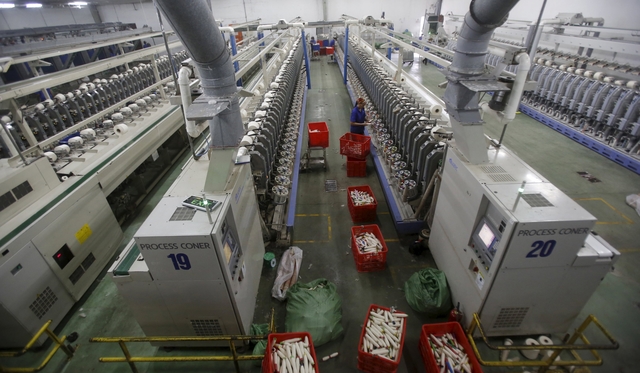The conclusion of the five-year negotiations on the Trans-Pacific Partnership (TPP) agreement may be hailed as a huge success by the 12 participating countries, but some industries in Vietnam believe that the ambitious trade deal will not only bring opportunities to them.
Not all the gains from the pact, which would liberalize trade in 40 percent of the global economy for a region stretching from Vietnam to Canada, will be spread evenly among Vietnamese industries, according to insiders.
While Vietnam’s apparel and footwear sectors are poised to benefit from the elimination of tariffs in the U.S. and other major export markets, such industries as agriculture and livestock may have more challenges than chances.
“It can be said that livestock will face the most difficulties once the TPP takes effect,” Minister of Industry and Trade Vu Huy Hoang told the Vietnam News Agency on the heels of the announcement of the TPP deal in Atlanta on Monday.
Vietnam’s livestock sector, clouded by heavy reliance on imported feed, poor safety and hygiene and obsolete technology, is less competitive compared to other regional countries.
“Livestock businesses received the TPP conclusions with concerns and worries,” Tran Dung Khanh, general secretary of the Vietnam Poultry Association, told The Saigon Times Online.
The Vietnamese sugar cane sector is also likely to become less competitive against other TPP competitors as it incurs much higher production costs, according to analysts with the BIDV Securities.
“It costs US$55-60 to produce a metric ton of sugar canes in Vietnam, but only $20 in Australia,” the stock company said in a report obtained by Tuoi Tre News.
Vietnam’s pharmaceutical companies will also face tougher competition from foreign rivals, with import taxes on pharmaceuticals, currently averaging 2.5 percent, set for elimination, BIDV Securities analysts said in the report.
The patent protection of pharmaceutical products will also be increased as per the TPP accord, and Vietnamese companies’ access to new products and ability to produce new drugs will thus be restricted.
Sectors that embrace TPP
The garment, footwear, seafood, and wood industries are among those that welcome the TPP, according to the BIDV Securities report.
The management boards of industrial parks, logistics firms, and car distribution businesses across the country will also benefit from the trade deal, with foreign investment expected to soar and import-export activities to become busier thanks to the liberalized market.
“The TPP will enable us to penetrate deeper and more directly into the U.S. market, instead of working with a network of many intermediaries,” Nguyen Ngoc Lan, deputy general director of Nhabe Garment Corp (NBC), told Tuoi Tre (Youth) newspaper on Wednesday.
NBC’s exports are targeted at $640 million in 2015, with the U.S. market accounting for 40 percent, or $256 million.
“We will save a great deal of cost being able to work directly with customers in the U.S.,” he said.
The U.S. is also the most important market of Gia Dinh Co., a Ho Chi Minh City-based shoemaker, as it makes up 55 percent of the company’s export turnover, which is expected to top $40 million this year.
“Last year many customers began shifting orders from China to us in anticipation of the TPP,” director Nguyen Chi Trung said.
Now that the TPP has become a reality, Gia Dinh Co. is confident that more importers will switch to Vietnam from China for footwear products.
Vietnamese car distribution businesses are also expected to grab the opportunity of the TPP as imports from Japan and the U.S., which currently constitute as much as 13 percent of the total turnover, will soar after the trade pact becomes effective.
Imports from the U.S. grew 140 percent last year from a year earlier, whereas the growth from the Japanese market was 90 percent, according to the BIDV Securities report.
The agreement must still be ratified by lawmakers in the TPP nations, which include Australia, Brunei, Canada, Chile, Japan, Malaysia, Mexico, New Zealand, Peru, Singapore, the U.S. and Vietnam, before it can take effect.
The participating countries will soon begin taking relevant legal steps to have the pact passed by their legislative bodies, a process Minister Hoang said normally takes at least 18 months.
Vietnam will thus have time for preparation to deal with the challenges that may come, with the lead Vietnamese negotiator of the trade deal believing the country can make it thanks to two decades of experience in integrating with the world’s economy.
“Vietnam has 20 years of experience, and a similar amount of time for preparation, so I believe we are strong enough to play this game,” Deputy Minister of Industry and Trade Tran Quoc Khanh told reporters after his arrival in Hanoi from Atlanta on Tuesday.
Like us on Facebook or follow us on Twitter to get the latest news about Vietnam!





















































